Wells Fargo Chairman and Chief Executive John Stumpf returned to Capitol Hill today to testify before the House Financial Services Committee, where angry lawmakers excoriated him over the bank’s admission that employees created some 2 million fake accounts to meet sales goals. The scandal was first uncovered by The Times in 2013 and led to a $185-million settlement with regulators this month.
After the Senate Banking Committee raked Stumpf over the coals last week, the bank’s board announced he would forfeit compensation worth about $45 million.
A recording of the hearing can be watched on YouTube.
- Share via
Wells Fargo CEO hurries away after hours of blistering questions
Wells Fargo Chief Executive John Stumpf quickly left the Rayburn House Office Building today after facing more than four hours of blistering questioning from lawmakers angry about the bank’s creation of millions of bogus accounts in customers’ names.
Stumpf would not answer reporters’ questions after numerous members of the House Financial Services Committee criticized his handling of the controversy and questioned his ability to run the giant bank.
“I’m amazed at what you don’t know about your business. I’ve heard more ‘I don’t knows’ from a CEO than I think I ever heard in my life,” Rep. Roger Williams (R-Texas) told Stumpf. “I’ve got one simple question for you: When are you going to resign?”
Toward the end of the hearing, Rep. Maxine Waters (D- Los Angeles), the panel’s top Democrat, told Stumpf, “I’m concerned that maybe you don’t have a handle on your management.”
“I have come to the conclusion that Wells Fargo should be broken up,” she said. “It’s too big to manage.”
Rep. Denny Heck (D-Wash.) said he was not impressed with Stumpf’s testimony.
“After four hours, my takeaway, sir, is that you are in denial,” Heck told the CEO. “Frankly, I don’t personally see how you survive.”
- Share via
About-face: Wells Fargo’s CEO volunteered to give up some pay after saying he wouldn’t
At last week’s Senate Banking Committee hearing, Wells Fargo Chief Executive John Stumpf repeatedly dodged questions over whether his pay or the pay of an executive at the heart of the fake-accounts scandal should be docked.
He told senators several times that decisions about executive pay would be made by a committee within the bank’s board of directors, and that he would not make a recommendation one way or another.
But today, before members of the House Financial Services Committee, Stumpf said that he recommended that the board dock his pay. The board announced Tuesday that Stumpf would give up about $45 million in compensation – a move Stumpf now says he volunteered to make.
Answering questions from Rep. Frank Guinta (R-N.H.), Stumpf said he spoke with Wells Fargo’s lead independent director, former General Mills executive Stephen Sanger, over the weekend and said he wanted to give up some pay.
Guinta was curious why Stumpf was so adamant last week about not getting involved in the board committee’s decision, and why he reversed course.
“I developed that thinking over the weekend,” Stumpf said. “It’s what I thought was right for me to recommend to the board.”
- Share via
Wells Fargo’s focus on ‘products’ is called out: ‘You don’t sell Veg-o-Matics’
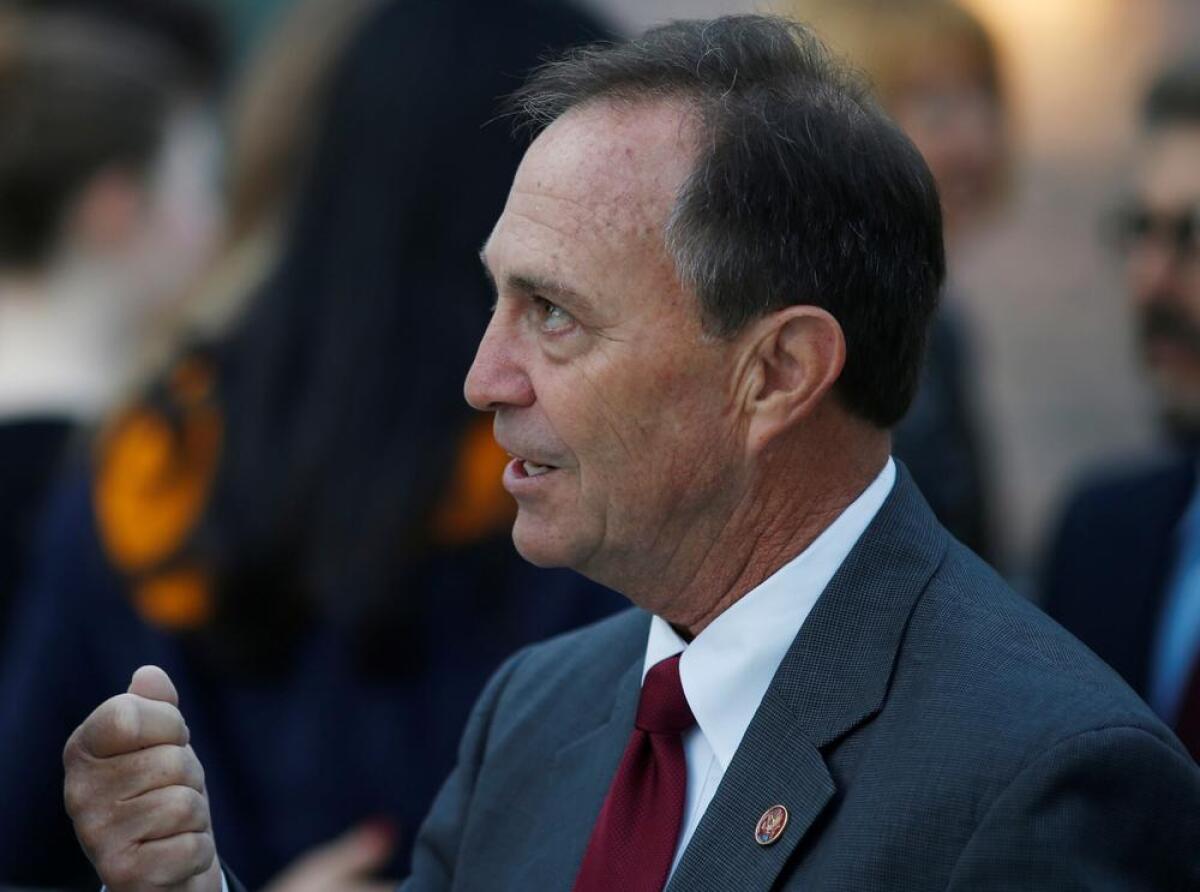
In his questions for Wells Fargo Chief Executive John Stumpf, Rep. Ed Perlmutter (D-Colo.) focused on an issue not particular to that bank but exemplified by its practices and its in-house terminology: Banks are focused not simply on taking deposits and making loans, but on selling “products.”
Most big banks have several products, from basic checking and savings accounts to debit cards, credit cards and retirement accounts. And most big banks want their customers to use several products -- an idea known as cross-selling.
Wells Fargo is famous for its focus on sales and for years has reported the success of its cross-selling strategy, providing quarterly figures on the number of accounts used by the average customer -- something other banks generally don’t do. In the second quarter, the bank reported that among its customers, the average retail banking household used 6.27 Wells Fargo products.
That sales focus has rankled lawmakers and exposed a deeper unease about the business of modern banking.
“I’ve heard terms today I don’t really align with the banking business,” Perlmutter said. “‘Sales organization,’ ‘retail sales,’ ‘stores’ -- I never once in my life referred to my branch bank in Applewood, Colo., as a store. You don’t sell Veg-o-Matics. … Why are you calling these things stores? You’re a bank.”
Perlmutter said the notion that banks are stores selling products lies at the root of Wells Fargo’s fake-accounts scandal.
“You’ve got to stop,” he said. “That creates the wrong culture.”
- Share via
‘You’re the CEO and you don’t know this?’
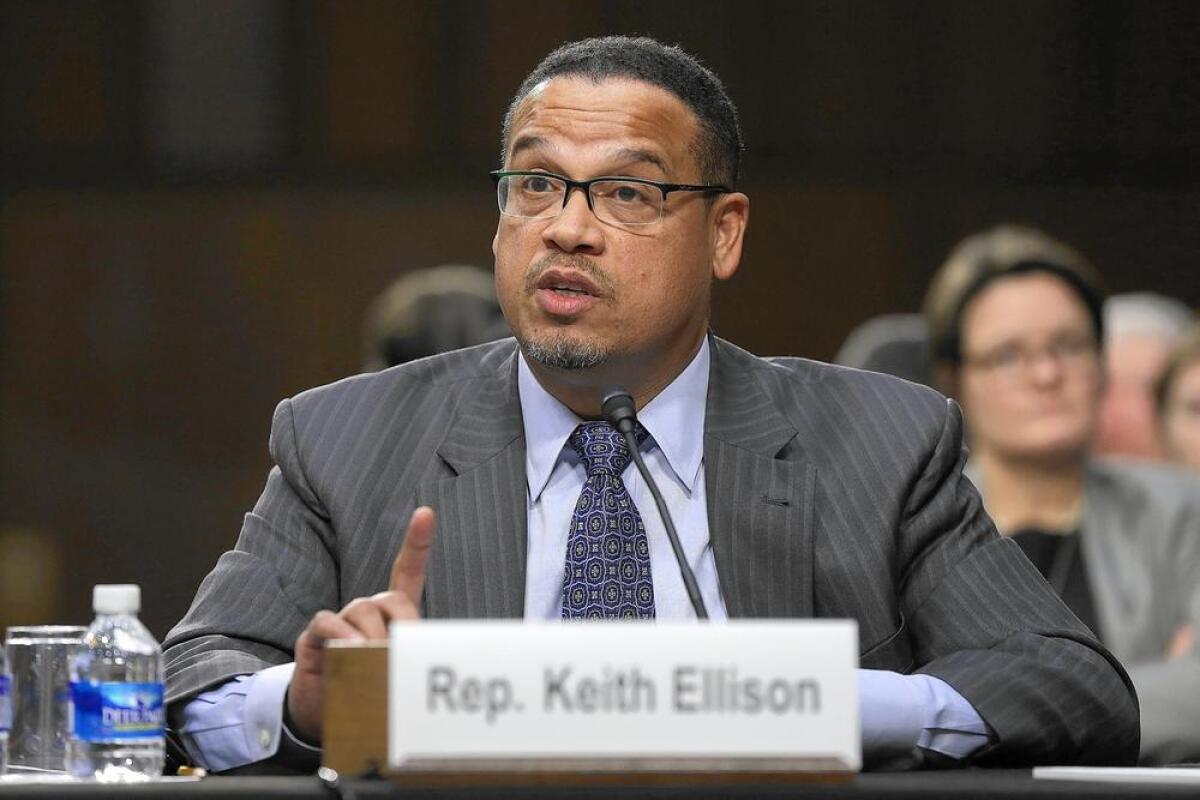
Wells Fargo chief executive John Stumpf said he didn’t know many of the details about how the company’s sales goals were implemented at the bank’s branches.
Rep. Keith Ellison (D-Minn.), who participated in a June forum with other lawmakers and about 40 workers from Wells Fargo and other banks, questioned Stumpf on Thursday on a variety of practices reported by those employees.
“Each banker was expected to make 100 calls a day” to drum up new business, Ellison told Stumpf.
“That’s the first time I’ve ever heard of that,” Stumpf said.
Ellison continued, “Were there questions asked of workers about how will they sell more credit cards?”
“I don’t know that,” Stumpf said.
“Were they given warnings?” Ellison asked. “You’re the CEO and you don’t know this?”
“Congressman,” Stumpf replied, “I don’t know that level of detail.”
- Share via
Could Wells Fargo be prosecuted under a law built to fight mafia chiefs?
Rep. Stephen Lynch (D-Mass.) raised an unpleasant prospect for the bank: prosecution under the Racketeer Influenced and Corrupt Organizations Act.
More commonly known as the RICO Act, the law was enacted in 1970 to fight organized crime by allowing mafia chiefs to be prosecuted for crimes they ordered but did not personally carry out.
It has been used to prosecute alleged financial crimes -- famously against junk bond king Michael Milken. It can be used in both criminal and civil cases and allows for damages to be tripled.
“I do want to note that under the Racketeer Influenced and Corruption Act ... you’ve satisfied all the elements of that,” Lynch told Wells Fargo CEO John Stumpf. “No. 1 is fraud, and there is no question about that -- mail fraud, securities fraud, you’ve done it all. You’ve covered basically every aspect of fraud in your bank over the last five years.”
“Secondly,” he said, “in many cases these employees, these whistleblowers, were intimidated or fired.”
Later in the hearing, Rep. Michael Fitzpatrick (R-Pa.) noted that “being fired in the federal government for [being] a whistleblower is a very serious matter. Hopefully you’re taking it as seriously as anybody else would.”
Stumpf said that Wells Fargo took it “very seriously” and that the bank had a non-retaliatory policy.
The Justice Department has already begun an investigation into the bank, which started after Wells Fargo’s $185-million settlement with regulators this month.
- Share via
Wells Fargo CEO knew for years about problems with unauthorized accounts
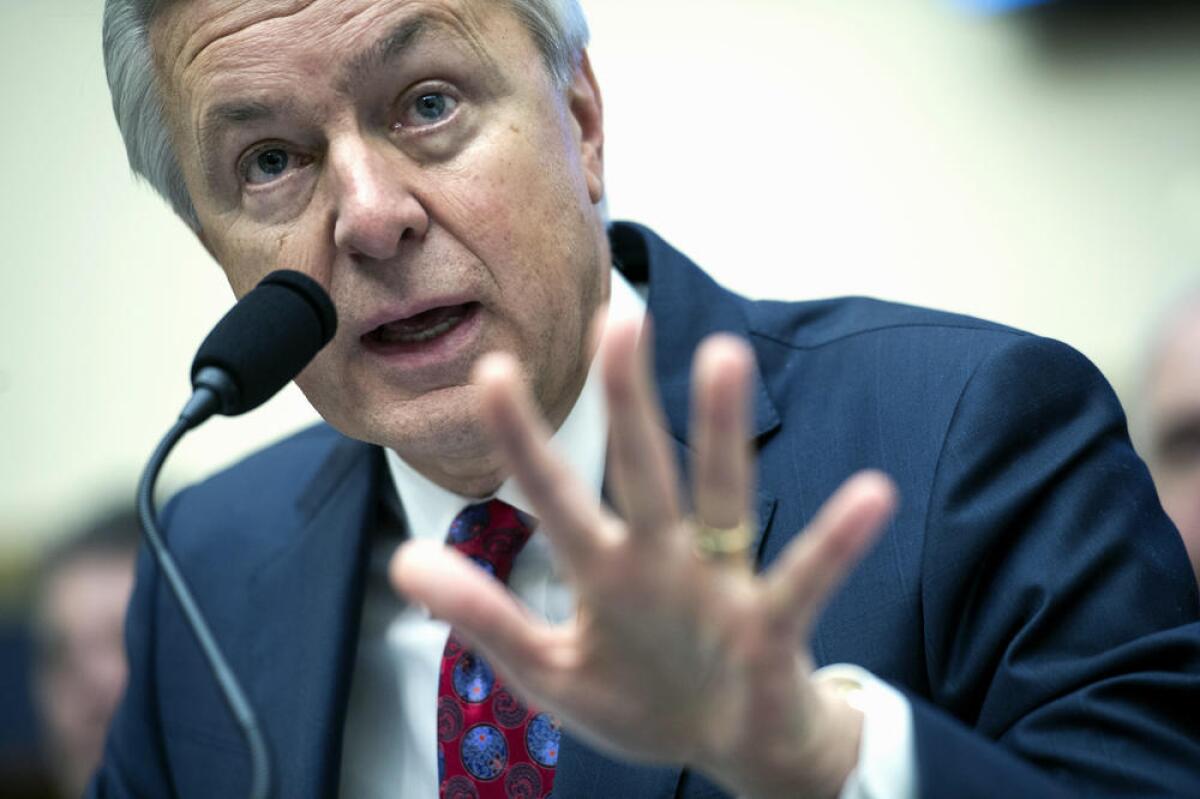
Chief Executive John Stumpf said he was not surprised by the 2013 Los Angeles Times article that first shed light on Wells Fargo employees’ practice of opening accounts without customers’ authorization to meet sales goals.
During testimony Thursday, he said he had always been aware it was an issue, but did not know it was “becoming a bigger issue” until the summer or fall of 2013.
Stumpf said that he has “always known that not everyone will do everything right every day” and that employees needed to be monitored. In mid- or late 2013, he said he was notified there had been “an acceleration of this activity in a certain marketplace.”
“That’s when I first knew this was becoming a bigger issue,” he said. “I was not surprised by the L.A. story.”
That testimony probably will lead to further scrutiny from lawmakers, who have fixated on what Wells Fargo executives knew, when they knew about it and what they did to address the problems at the bank.
- Share via
Wells Fargo CEO is getting only seconds to speak
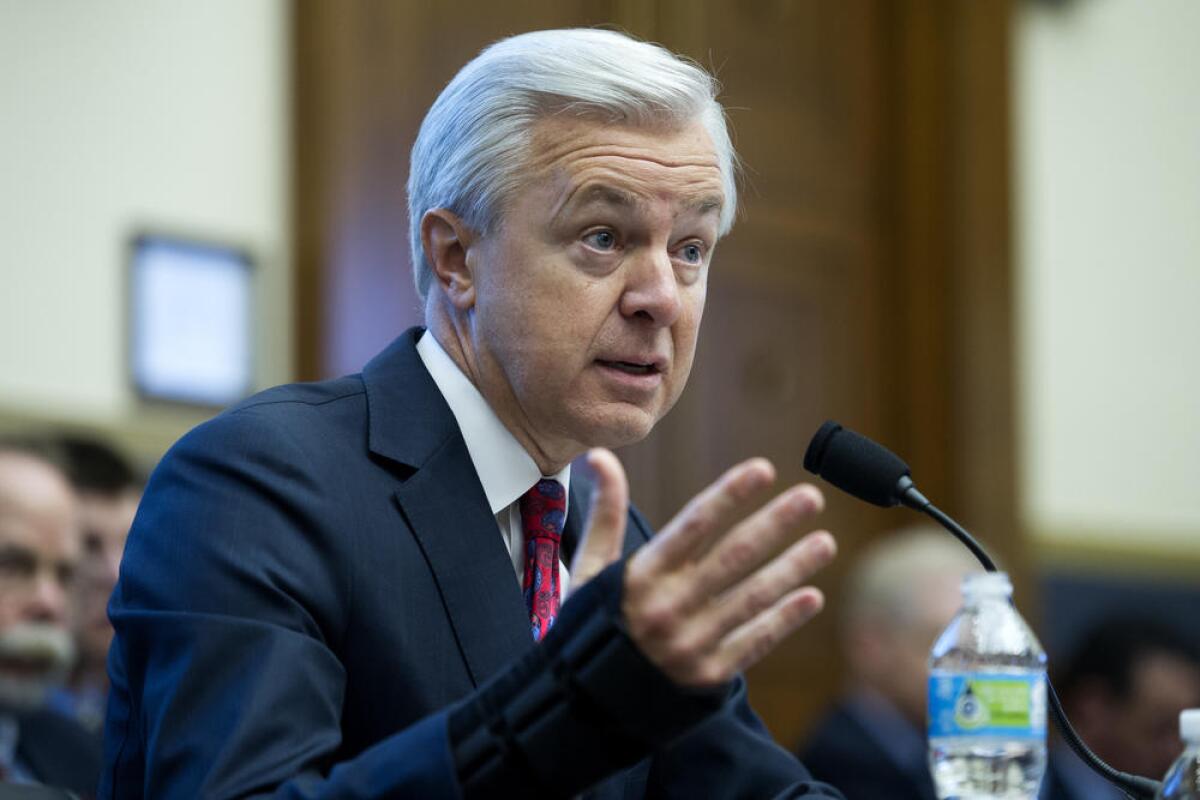
Like the rest of the members of the House Financial Services Committee, Rep. Steve Pearce (R-N.M.) had plenty of questions for Wells Fargo CEO John Stumpf -- and like other members, he didn’t seem particularly interested in giving Stumpf a chance to answer.
Each member of the committee gets five minutes to question Stumpf, and a bit more if the committee chairman allows. During 5 minutes and 26 seconds of back and forth between Stumpf and Pearce, Stumpf spoke for just 36 seconds.
That’s about par for the course at Thursday’s hearing, with committee members taking as much of their time as possible to lambaste Stumpf for failing to stop bad practices sooner, for not informing investors about fraudulent accounts before the scandal broke and for not resigning once it did.
Pearce said the revelation that Wells Fargo fired 5,300 employees for opening fake accounts and other ethical violations show either that the bank is too big to manage or that Stumpf and others overlooked problems to line their own pockets.
“I see size and complexity being a great problem when you can’t see 5,300 being terminated,” Pearce said. “Maybe it was your stock compensation. Maybe it was your size and complexity. I, sir, think you ought to submit your resignation.”
Stumpf’s 36 seconds of speaking did not come in a single stretch. Mostly he was only able to utter beginnings of sentences before Pearce interrupted him.
- Share via
Lots of lawmakers want their 5 minutes of ripping into Wells Fargo’s CEO
More than half of the 60 members of the House Financial Services Committee are at the Wells Fargo hearing, an unusually high turnout given that other hearings are happening now too. Most if not all of the panel members are here to get their five minutes of ripping into Chief Executive John Stumpf. Many barely gave Stumpf a chance to respond.
Lawmakers’ comments have included:
“Something is going wrong at this bank, and you are the head of it,” said Rep. Gregory Meeks (D-N.Y.) “If the buck stops with you … then you should be fired because it stops with you.”
“Wells Fargo was making a lot of money off of what you were doing, and I think you were hoping you weren’t caught,” said Rep. Sean Duffy (R-Wis.).
“You have failed,” Rep. Patrick McHenry (R-N.C.) said, telling Stumpf that he had broken longstanding law, defrauded his customers and neglected to meet his own company’s ethics guidelines. “How can you rebuild trust?”
“Whatever ultimately legally comes out of this process,” Rep. Frank D. Lucas (R-Okla.) said, “you just made it really hard, really hard for those of us who want to maintain the concept of a market economy, who want to continue to make sure that bankers, not some bureaucrat somewhere, are the arbitrageurs of capital.”
“I know right from wrong,” Stumpf told Lucas. “I know we have a lot of wrongs to right here.”
- Share via
The parable of the apologetic bank robber
An irate Rep. Gregory Meeks (D-N.Y.) barely let Wells Fargo’s John Stumpf get a word in, using his time at Thursday’s House Financial Services Committee hearing to castigate the CEO for saying he took responsibility for the bank’s fake-accounts scandal while getting to keep his job.
Meeks likened Stumpf to an apologetic bank robber.
“If somebody walked into Wells Fargo tomorrow and robbed your bank or defrauded your bank and then after they are caught they say, ‘Well I’m sorry, I am going to take full responsibility for robbing your bank ... so please don’t prosecute me because I am sorry now that I robbed this bank,’ would you allow the person just to walk out after robbing your bank?” Meeks asked.
Stumpf acknowledged that the bank, like any big company, does not always do everything right, prompting a fiery response from Meeks.
“If you’re not doing everything right, who’s accountable for it? Who is paying for it? Don’t come tell me you’re sorry,” Meeks said.
Another member of the committee, Rep. Michael Capuano (D-Mass.) followed a similar line of questioning, asking how Stumpf and his leadership team are different from a suspected bank robber, Robert Holmes, who was arrested last month for allegedly holding up a Wells Fargo branch in Lancaster, Pa.
“What’s the difference between you and Mr. Holmes? At his arraignment, he said he was sorry,” Capuano said. “Why shouldn’t you be in jail?”
Stumpf responded, “Being dishonest and breaking the law is something very different.”
- Share via
Wells Fargo CEO says he won’t waive requirement that customers use arbitration instead of lawsuit
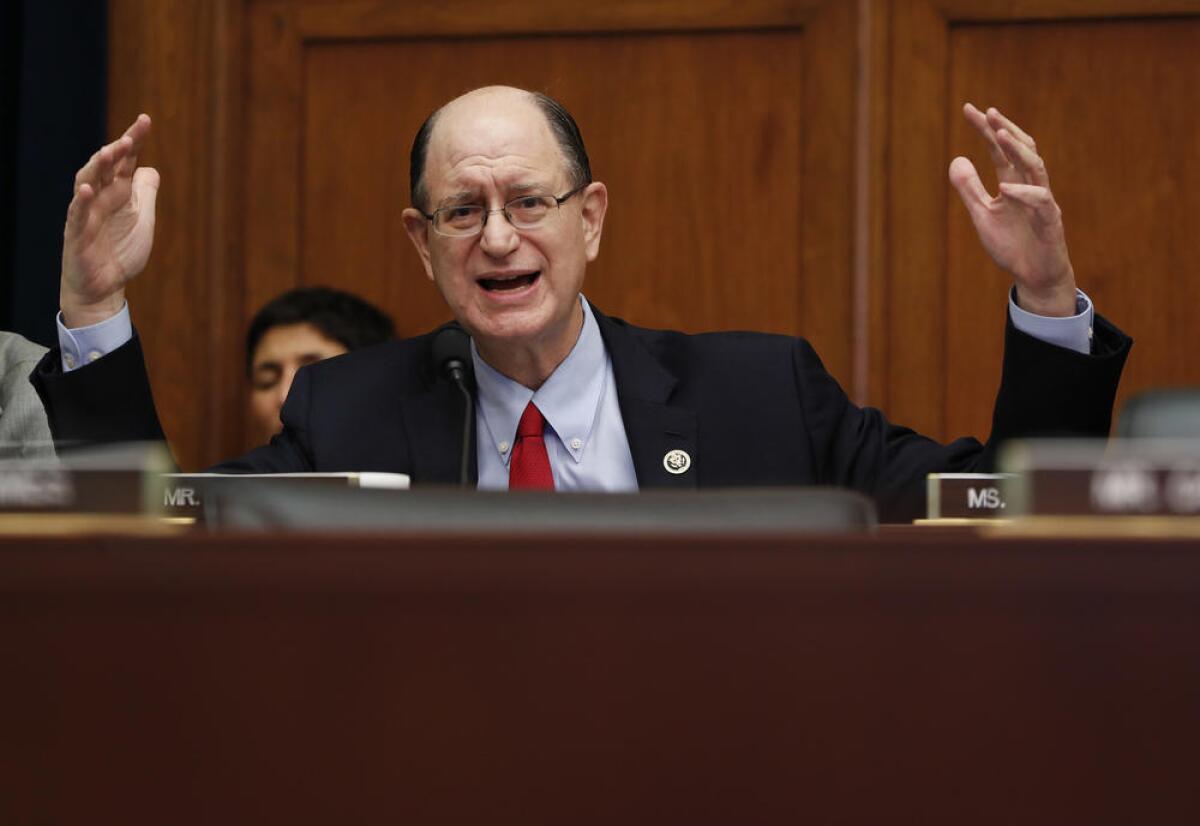
Rep. Brad Sherman (D-Porter Ranch) pressed Wells Fargo chief John Stumpf on whether he would waive clauses for harmed customers that force them to have their disputes heard by arbitrators and prevent them from filing lawsuits.
“If they want their day in court, are you going to screw them out of that?” Sherman asked. Stumpf said the bank was hiring mediators for such cases, but Sherman pressed him again: “Will you let them go to court? Yes or no?”
“No, but with an explanation,” Stumpf said. But Sherman did not want to hear the explanation and moved on to more questions.
Sherman also said he wants to call in chief executives of other big banks to ask about sales practices. “I don’t think you should be alone in this joyous experience,” he told Stumpf. “Your colleagues should at least come forward with some assurance.”
- Share via
‘People should not be fired, terminated for missing sales goals’
People should not be fired, terminated for missing sales goals. I’m not saying it didn’t happen.
— Wells Fargo Chief Executive John Stumpf
- Share via
Wells Fargo’s illegal sales practices go back to 2007, Rep. Maloney says
Rep. Carolyn Maloney (D-N.Y.) pressed Wells Fargo chief John Stumpf on his sale of $13 million worth of the bank’s stock on Oct. 30, 2013, around the time he learned of the fake accounts scandal.
“Did you dump the stock after you found out about the fraudulent accounts? Because it seems like the timing is very, very suspicious and it raises serious questions,” she said to Stumpf at a House Financial Services Committee hearing.
After trying to deflect the question, Stumpf admitted he sold the shares but said it was “without any view” toward the scandal.
Maloney also pushed Stumpf to review accounts from as early as 2007, pointing to a Montana lawsuit that alleged fraudulent sales practices going back to that year.
“Now we have evidence of illegal sales practices going back to 2007. Will you agree to extend the review period to 2007?” Maloney asked.
Stumpf would not commit to extending the review.
He said that the bank would compensate consumers if there’s evidence they had fake accounts created before 2009, but that the review would only go back to 2009.
- Share via
Wells Fargo CEO defends the bank’s practice of cross-selling
In his opening statement before the House Financial Services Committee, Wells Fargo Chief Executive John Stumpf offered little new information about the bank’s response to the unfolding fake-accounts scandal and continued to say he plans to stay at the helm of the San Francisco institution.
“I am fully accountable,” Stumpf said, echoing comments made last week before the Senate Banking Committee. “We should have done more sooner. We will not stop until we get this right.”
He said that when he says he is accountable, he means in part that he is accountable for “leading Wells Fargo as the company restores the trust of customers, team members and investors.”
The embattled CEO also stood up for the bank’s focus on cross-selling, the practice of trying to get customers to open and use many of the bank’s products and services, which some critics say led to a sales culture that incentivized employees to open unauthorized accounts.
“Some have suggested the problem was cross-selling,” Stumpf said. “At its core, cross-selling is about deepening customer relationships. If we take care of our customers, they will deepen their relationships with us. That is cross-selling done the right way.”
Stumpf offered previously announced details of steps the bank has taken to address the sales goals that led to the scandal and to find and compensate affected customers. The bank will end its sales goal system at the end of this week and is contacting customers who may have had unauthorized checking accounts, savings accounts or credit cards opened in their names.
On the credit card front, which was of particular interest to senators, who wondered how the bank might compensate customers whose credit scores may have been affected by unwanted credit cards, Stumpf said the bank has spoken with more than 20,000 affected customers.
“Fewer than 25% have told us they either did not apply for the card or cannot recall whether or not they applied for the card,” he said. “For any customer who does not want their card, we are closing the account and informing the credit bureaus. And we are developing a process to deal with any other form of harm.”
- Share via
‘Today’s hearing is just the beginning of our investigation’
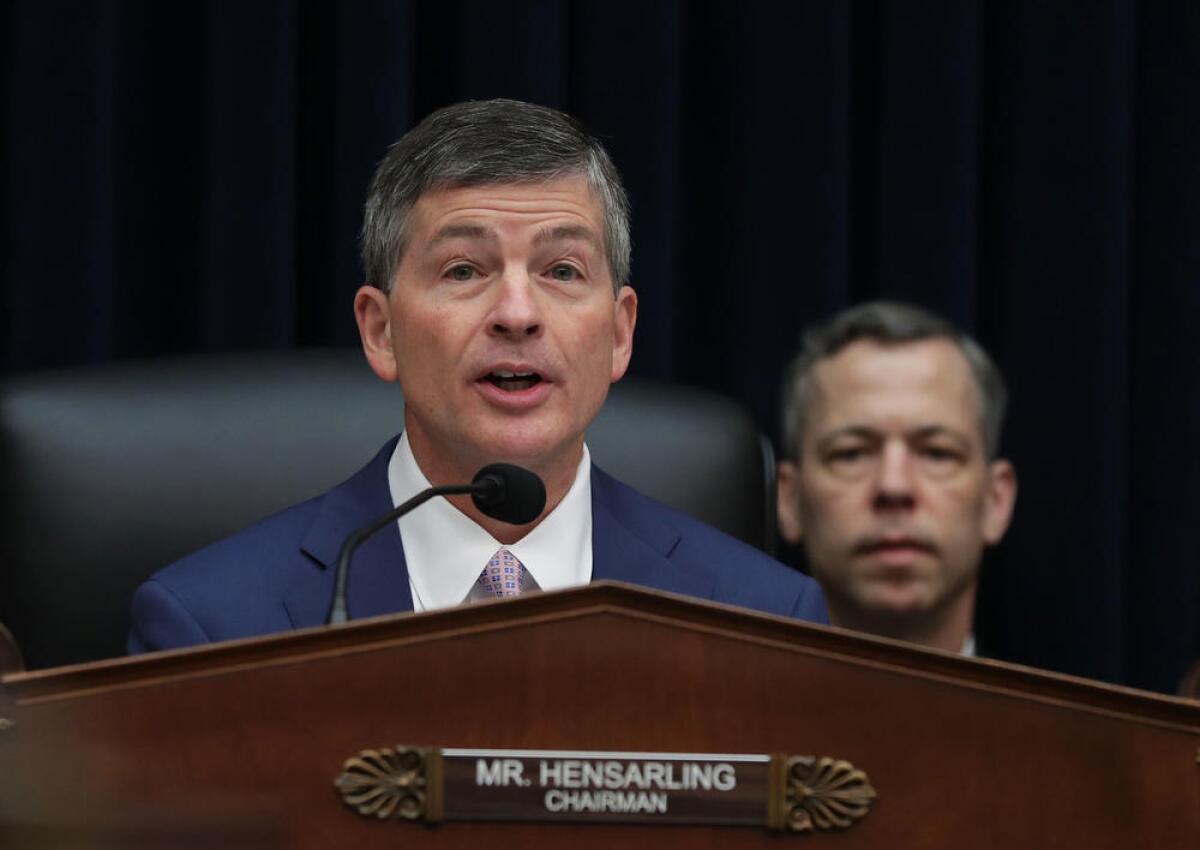
Reps. Jeb Hensarling (R-Texas), the chairman of the House Financial Services Committee, and Maxine Waters (D-Los Angeles), its top Democrat, represent the far ends of the political spectrum and rarely agree on much as they sit side by side on the dais of one of the most powerful panels on Congress.
But on Thursday, they joined in ripping into Wells Fargo Chief Executive John Stumpf for the scandal at the bank involving the creation of about 2 million accounts that customers didn’t authorize. It was another bipartisan pounding of Stumpf, building off a hearing by similarly outraged senators last week.
“I regrettably have a mortgage with your bank. I wish I didn’t,” Hensarling told Stumpf at the start of a committee hearing on the scandal. “If I were in a position to pay it off, I would.”
Hensarling said the committee had launched an “in-depth investigation” and was gathering thousands of pages of documents from Wells Fargo and federal regulators.
“Today’s hearing is just the beginning of our investigation,” he said. “We will make sure those were betrayed by Wells Fargo are not forgotten.”
Waters was just as rough on Stumpf.
“Mr. Stumpf, the word games stop today,” she said. “Let’s call it what it really is: some of the most egregious fraud we’ve seen since the foreclosure crisis.”
- Share via
L.A. city attorney knew early that Wells Fargo case was huge

I’ve been a legislator, and as a legislator, if I would get five or six dozen phone calls on an issue, that would be a very important issue. After we filed this case, we received more than 1,000 emails and phone calls.
— L.A. City Atty. Mike Feuer
- Share via
Fireworks from the first Wells Fargo hearing
Members of the Senate Banking Committee pilloried John Stumpf, CEO and chairman of the San Francisco banking giant, over revelations that thousands of bank workers opened as many as 2 million accounts for customers without their knowledge, all in the name of meeting sales quotas that regulators say encouraged bad behavior.
Republicans and Democrats went after Stumpf in a rare display of bipartisan agreement that underscores the severity of the case against the bank.
Some of the fiercest comments came from Elizabeth Warren (D-Mass.), known for her stinging criticism of Wall Street.
“You should resign,” Warren said. “You should give back the money you took while this scam was going on, and you should be criminally investigated by the Department of Justice and the Securities and Exchange Commission.”
- Share via
ICYMI: Catch up on the Wells Fargo scandal

Federal regulators said Wells Fargo employees opened accounts in customers’ names without their consent.
The Los Angeles Times first uncovered a pervasive culture of aggressive sales goals that pushed thousands of workers to open as many as 2 million accounts that bank customers never wanted. Regulators have called it “outrageous” and “a major breach of trust.”
That 2013 story caught the attention of Los Angeles City Atty. Mike Feuer, who sued the bank in May 2015.
The suit was settled this month. The bank did not admit any wrongdoing, but it apologized to customers and announced steps to change its sales practices. It will pay $100 million to the Consumer Financial Protection Bureau — the largest fine the federal agency has ever imposed — as well as $50 million to the city and county of Los Angeles and $35 million to the Office of the Comptroller of the Currency.
New details emerged as part of the settlement, including numbers that sparked outrage. The CFPB said 5,300 Wells Fargo workers have been fired for improper sales practices since 2011 and that as many as 2 million accounts were opened without customers’ authorization.
- Share via
Wells Fargo claws back $45 million from CEO
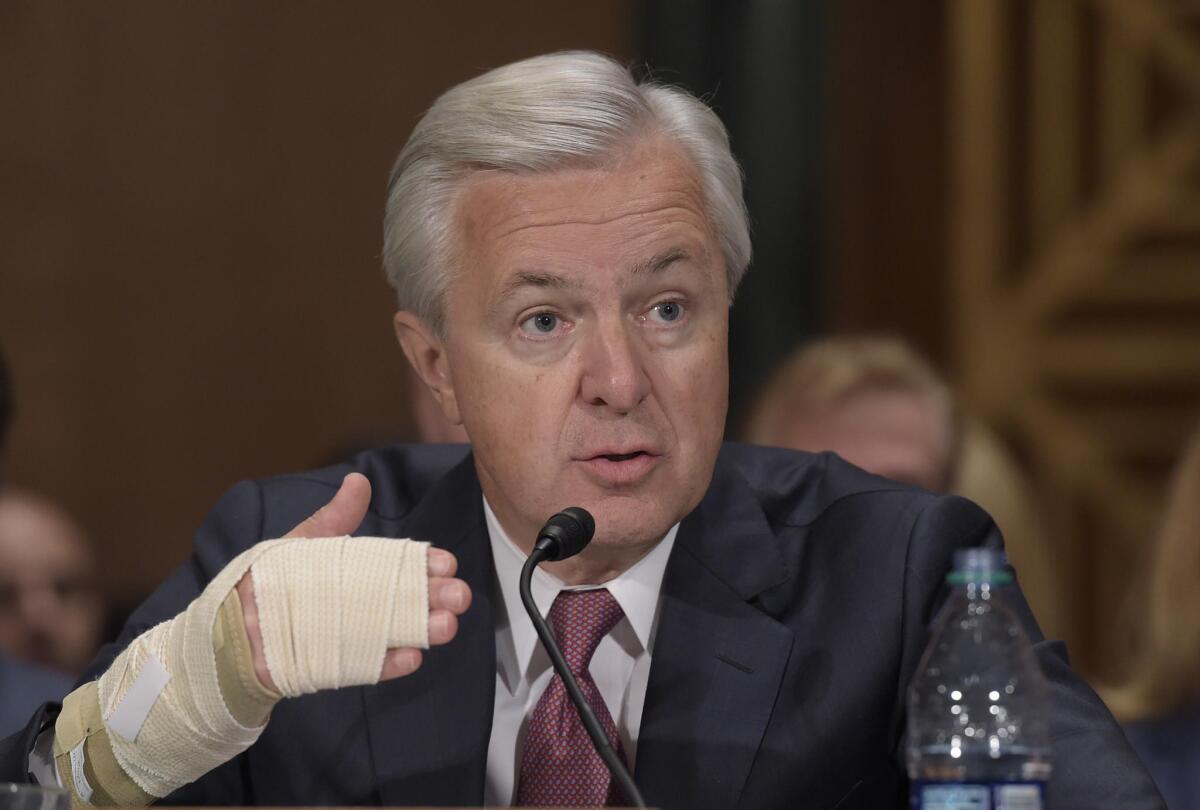
Wells Fargo & Co. Chief Executive John Stumpf will forfeit compensation worth about $45 million as the bank tries to appease angry lawmakers and regain the trust of customers amid the still-unfolding scandal over fake accounts.
Stumpf will give up about 910,000 shares in unvested stock awards and will not get a bonus this year, according to a statement released late Tuesday by members of Wells Fargo’s board of directors.
Carrie Tolstedt, the executive in charge of the division where much of the activity took place, will give up about $19 million worth of stock.
- Share via
Another villain in the Wells Fargo scandal?
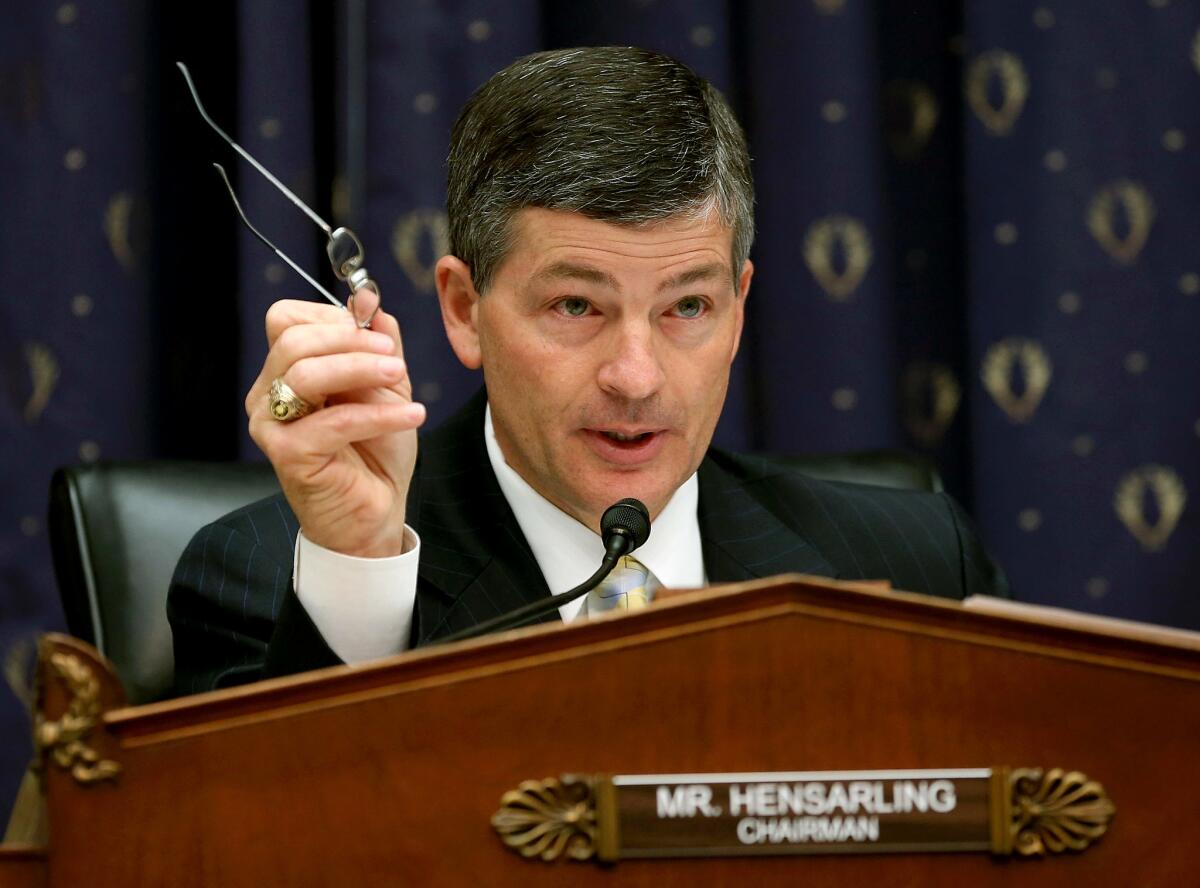
Wells Fargo & Co. Chief Executive John Stumpf has taken the brunt of the anger over the bank’s fake-accounts scandal. But at Thursday’s hearing before the House Financial Services Committee, Republicans are expected to start laying the groundwork to blame the Consumer Financial Protection Bureau, a new federal agency, for not doing enough to protect customers from abuses by the bank.
The hearing will be presided over by Rep. Jeb Hensarling (R-Texas), who has blasted Wells Fargo for what he called theft and fraud of customers, but also is one of the biggest critics of the bureau.
CFPB Director Richard Cordray will be on the hot seat for another hearing on the Wells Fargo issue.
“Why does it take the L.A. Times to break this story, when we’re paying federal investigators to investigate?” Hensarling recently told Fox Business Network. “Where was the CFPB? Why did they come in so late to the game?”